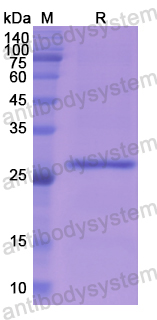Catalog No.
YHC24401
Expression system
E. coli
Species
Homo sapiens (Human)
Protein length
Gln62-Leu291
Predicted molecular weight
28.70 kDa
Nature
Recombinant
Endotoxin level
Please contact with the lab for this information.
Purity
>90% as determined by SDS-PAGE.
Accession
P07306
Applications
ELISA, Immunogen, SDS-PAGE, WB, Bioactivity testing in progress
Form
Lyophilized
Storage buffer
Lyophilized from a solution in PBS pH 7.4, 0.02% NLS, 1mM EDTA, 4% Trehalose, 1% Mannitol.
Reconstitution
Reconstitute in sterile water for a stock solution. A copy of datasheet will be provided with the products, please refer to it for details.
Shipping
In general, proteins are provided as lyophilized powder/frozen liquid. They are shipped out with dry ice/blue ice unless customers require otherwise.
Stability and Storage
Use a manual defrost freezer and avoid repeated freeze thaw cycles. Store at 2 to 8°C for frequent use. Store at -20 to -80°C for twelve months from the date of receipt.
Alternative Names
HL-1, ASGP-R 1, Asialoglycoprotein receptor 1, CLEC4H1, ASGR1, C-type lectin domain family 4 member H1, ASGPR 1, Hepatic lectin H1
A High-Throughput Cell-Based Luciferase Reporter Assay for Identifying Inhibitors of ASGR1., PMID:40429734
ASGR1 inhibitors, inflammation, and heart failure: A Mendelian randomization analysis., PMID:40391737
Proteomic variation underlies the heterogeneous risk of metabolic dysfunction-associated steatotic liver disease for subsequent chronic diseases., PMID:40378187
Cross-sectional, interventional, and causal investigation of insulin sensitivity using plasma proteomics in diverse populations., PMID:40221021
The emerging role of glycans and the importance of sialylation in cardiovascular disease., PMID:40138819
Enhanced α2-3-linked sialylation determines the extended half-life of CHO-rVWF., PMID:40101144
Discovery of ASGR1 and HMGCR dual-target inhibitors based on supervised learning, molecular docking, molecular dynamics simulations, and biological evaluation., PMID:40080975
Serum Soluble Asialoglycoprotein Receptor 1: A Potential Predictor Marker Linked to Type 2 Diabetes Mellitus, Demonstrating Positive Correlation With High Sensitive C-Reactive Protein., PMID:40046108
Plasma proteins and herpes simplex virus infection: a proteome-wide Mendelian randomization study., PMID:39992613
Association Analysis of the Circulating Proteome With Sarcopenia-Related Traits Reveals Potential Drug Targets for Sarcopenia., PMID:39949133
Small Extracellular Vesicles Engineered Using Click Chemistry to Express Chimeric Antigen Receptors Show Enhanced Efficacy in Acute Liver Failure., PMID:39901768
Fusarolides A-C, Three Pyran-Macrolide Hybrids from a Marine Derived Fungal Fusarium verticillioide G102 as Asialoglycoprotein receptor 1 Inhibitor and Phytopathogenic Fungicides., PMID:39895130
Host cell lectins ASGR1 and DC-SIGN jointly with TMEM106B confer ACE2 independence and imdevimab resistance to SARS-CoV-2 pseudovirus with spike mutation E484D., PMID:39791910
Plasma proteomic signatures of social isolation and loneliness associated with morbidity and mortality., PMID:39753750
The low-density lipoprotein receptor: Emerging post-transcriptional regulatory mechanisms., PMID:39700747
ASGR1 deficiency improves atherosclerosis but alters liver metabolism in ApoE-/- mice., PMID:39616371
Cross-sectional, interventional, and causal investigation of insulin sensitivity using plasma proteomics in diverse populations., PMID:39606342
ASGR1 Deficiency Inhibits Atherosclerosis in Western Diet-Fed ApoE-/- Mice by Regulating Lipoprotein Metabolism and Promoting Cholesterol Efflux., PMID:39387120
Beyond conventional treatment: ASGR1 Leading the new era of hypercholesterolemia management., PMID:39316974
Detection of γ-OHPdG in Circulating Tumor Cells of Patients With Hepatocellular Carcinoma as a Potential Prognostic Biomarker of Recurrence., PMID:39280920
Rapid depletion of "catch-and-release" anti-ASGR1 antibody in vivo., PMID:39051531
Targeted protein degradation systems to enhance Wnt signaling., PMID:38847394
Depression proteomic profiling in adolescents with transcriptome analyses in independent cohorts., PMID:38812487
Incident heart failure in chronic kidney disease: proteomics informs biology and risk stratification., PMID:38757788
Notch1 regulates hepatic thrombopoietin production., PMID:38603632
The use of human iPSC-derived alveolar organoids to explore SARS-CoV-2 variant infections and host responses., PMID:38572923
Identification of receptors and factors associated with human coronaviruses in the oral cavity using single-cell RNA sequencing., PMID:38560173
The serum soluble ASGR1 concentration is elevated in patients with coronary artery disease and is associated with inflammatory markers., PMID:38539180
Deficiency of ASGR1 promotes liver injury by increasing GP73-mediated hepatic endoplasmic reticulum stress., PMID:38459023
Asialoglycoprotein receptor 1 promotes SARS-CoV-2 infection of human normal hepatocytes., PMID:38355848
A genetic association study of circulating coagulation factor VIII and von Willebrand factor levels., PMID:38320121
Deficiency of ASGR1 Alleviates Diet-Induced Systemic Insulin Resistance via Improved Hepatic Insulin Sensitivity., PMID:38310881
ASGR1 deficiency diverts lipids toward adipose tissue but results in liver damage during obesity., PMID:38281933
Analysis of SARS-CoV-2 Variant-Specific Serum Antibody Post-Vaccination Utilizing Immortalized Human Hepatocyte-Like Cells (HLC) to Assess Development of Immunity., PMID:38078048
Design, synthesis and biological evaluation of the positional isomers of the galactose conjugates able to target hepatocellular carcinoma cells via ASGPR-mediated cellular uptake and cytotoxicity., PMID:38039790
High-Carbohydrate Diet Consumption Poses a More Severe Liver Cholesterol Deposition than a High-Fat and High-Calorie Diet in Mice., PMID:37834148
Survey of organ-derived small extracellular vesicles and particles (sEVPs) to identify selective protein markers in mouse serum., PMID:37744304
Serum IgA augments adhesiveness of cultured lung microvascular endothelial cells and suppresses angiogenesis., PMID:37741001
Correlation between serum soluble ASGR1 concentration and low-density lipoprotein cholesterol levels: a cross-sectional study., PMID:37667265
In silico discovery of food-derived phytochemicals against asialoglycoprotein receptor 1 for treatment of hypercholesterolemia: Pharmacophore modeling, molecular docking and molecular dynamics simulation approach., PMID:37651861
Identifying Liver Metastasis-Related Genes Through a Coexpression Network to Construct a 5-Gene Model for Predicting Pancreatic Ductal Adenocarcinoma Patient Prognosis., PMID:37523607
Impact of Asialoglycoprotein Receptor and Mannose Receptor Deficiency on Murine Plasma N-glycome Profiles., PMID:37414249
Genetically mimicked effects of ASGR1 inhibitors on all-cause mortality and health outcomes: a drug-target Mendelian randomization study and a phenome-wide association study., PMID:37400795
Glutaredoxin 1 regulates cholesterol metabolism and gallstone formation by influencing protein S-glutathionylation., PMID:37277061
Age-dependent differences and similarities in the plasma proteomic signature of postoperative delirium., PMID:37156856
SARS-CoV-2 Receptors and Their Involvement in Cell Infection., PMID:37008884
Comprehensive analysis of SARS-CoV-2 receptor proteins in human respiratory tissues identifies alveolar macrophages as potential virus entry site., PMID:36700825
ASGR1: an emerging therapeutic target in hypercholesterolemia., PMID:36690631
Liver cancer cells as the model for developing liver-targeted RNAi therapeutics., PMID:36640667
ASGR1 promotes liver injury in sepsis by modulating monocyte-to-macrophage differentiation via NF-κB/ATF5 pathway., PMID:36621538

